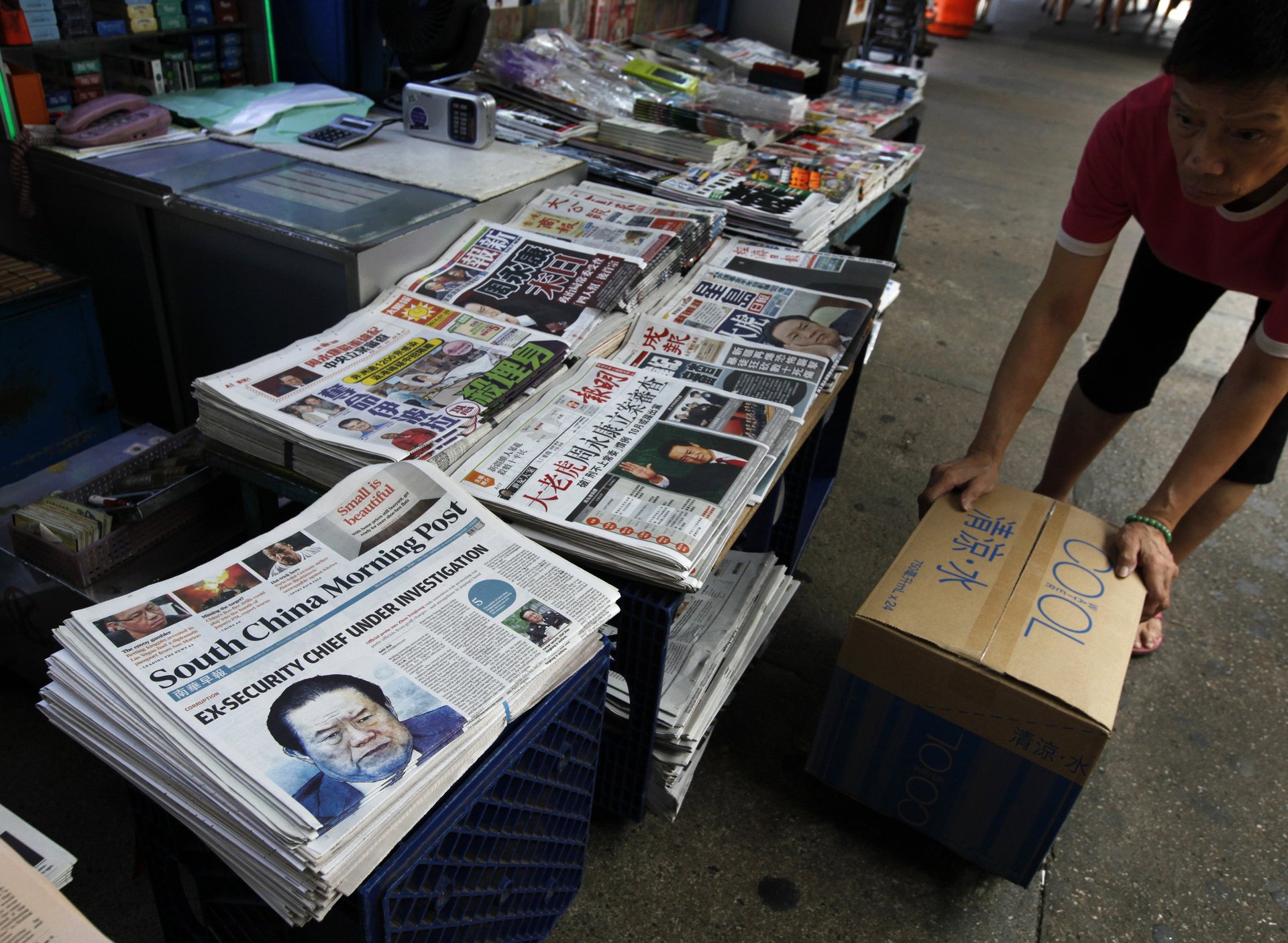Who cares if Jack Ma buys a tiny, dwindling newspaper in Hong Kong?
Update: Alibaba and the SCMP announced a deal on Dec. 11.

After lengthy negotiations, Alibaba founder Jack Ma may be close to an investment in the publisher of the South China Morning Post, according to reports in Bloomberg, the New York Times, and Caixin.
The SCMP Group has confirmed that it is indeed in talks to sell parts of its media business, but does not say to whom, and adds that negotiations remain in the early stages.
It is unclear whether Ma would buy all or some of the SCMP Group. He already has a media empire that rivals Amazon’s Jeff Bezos, and has invested in two US-based social media apps—Tango and Snapchat. But the maybe-pending SCMP bid has already attracted nearly as much attention as any of those done deals.
That’s because with the SCMP, Ma’s personal politics will move into a global spotlight, for anyone to see and read in English.
The SCMP was once the English-language paper of record for reporting on China. Founded in 1903 as the “printing house for the Chinese revolution,” it covered far more than just Hong Kong. Throughout the fifties and sixties, it was often the first source for information about the famines and political clashes of the Mao era. After the country opened up, its multi-national staff would regularly break stories about political scandals and human rights abuses on the mainland, even after Hong Kong was handed over to China in 1997.
Its reporting was rewarded financially. In 1997 it earned HK$805 million (over $200 million) in net profits, about $420 in profit per-reader. But in recent years, accusations of self-censorship and pro-Beijing bias plagued the paper. The industry-wide advertising downturn and shift to the internet hit hard:
After Rupert Murdoch sold his majority stake in the paper in 1993 to Robert Kuok, a Malaysian sugar tycoon with substantial investments in China, the paper’s reporting grew more conservative. Throughout the 2000’s, editors shuffled in and out the door as writers critical of Beijing gradually left the organization. Esteemed former staff like Jasper Becker, who authored three books before joining, Willy Lam, who covered politics, and Paul Mooney, pointed to killed stories as the cause of their departure.
As Hong Kong’s political fate under Beijing remained uncertain throughout the 00’s, the paper’s editorial tone became, in the words of Becker, “a barometer of Hong Kong’s freedoms.”
“[The] process of bringing it around to take a pro-Beijing stance is being carried out in a step-by-step way to avoid creating alarm,” wrote Becker of the paper after his dismissal. “The remolding of the South China Morning Post mirrors what is happening throughout Hong Kong,” he added.
Its financial and editorial reputation has not recovered in recent years. The paper provided ample space and impressive coverage of last year’s Umbrella Movement. But recently-resigned editor-in-chief Wang Xiangwei is ending his term much how it began—with a wave massive staff departures. In 2013, shares of the paper’s publisher, the SCMP group, were suspended from trading after they fell below the Hong Kong’s stock exchange minimum value.
Despite all this, decision-makers in Hong Kong from local tycoons to heads of banks to foreign diplomats consider the SCMP an important read. It’s one of the few local English-language publications that doesn’t treat China with knee-jerk antagonism, yet is not under direct control of the communist party. It remains the public voice of Hong Kong to the rest of the world; and Hong Kong still remains the gateway to China for global business.
Ma—who owns a $193 million home in Hong Kong and might retire in the city—is not exactly a Chinese Communist Party apologist. He has been a vocal critic of China’s policies toward health care, banking, education, and the environment. But when it comes to more contentious issues—Tibet, human rights, Taiwan—Ma has yet to be tested. When asked about Yahoo China’s role in helping jail activists critical of the government, he told reporters (paywall) “We create value for the shareholders and the shareholders don’t want us to oppose the government and go bankrupt. Whatever [government officials] say, we’ll do it.”
Many of Alibaba’s shareholders themselves are prominent government officials. It’s possible that Ma can revive the SCMP’s circulation by injecting some fresh business sense, but salvaging the paper’s editorial independence from Beijing will be tougher.